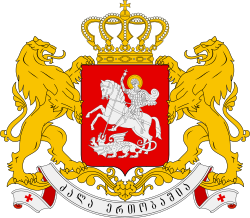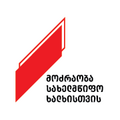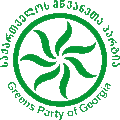| Logo | Party | Ideology | Years active | Note |
|---|
| Round Table—Free Georgia | Georgian nationalism
Sovereignism
Pan-Caucasianism | 1990–1994 | An alliance of Georgian political parties led by Zviad Gamsakhurdia. It played a decisive role in the restoration of independence of Georgia and was a governing coalition in 1990–1992. |
| National Forum | Isolationism
Parliamentarism
Classical radicalism | 2006–2017 | Radical political party led by Kakha Shartava and in the opposition in 2006–2012. Part of the ruling coalition in 2012–2016. Leading members left the party in 2017, which has become inactive since then. |
| New Rights | Liberal conservatism
Classical radicalism | 2001–2019 | One of the largest opposition parties, formed in 2001 as the New Conservative Party by uniting the New Faction, New Movement, and Neo-Conservative Union. A member of several opposition blocks, including the 2004 Right Opposition, the 2008 United Opposition, and the 2018 Strength is in Unity. Absorbed by Lelo for Georgia in 2019. |
| Christian-Democratic Movement | Christian democracy
Social conservatism | 2008–2018 | Opposition party with seats in the 2008–2012 Parliament. Party has never been disbanded but it has not had any activity since the 2018 presidential election. |
 | Democratic Union for Revival | Regionalism
Socialism | 1991–2004 | Originally known as the Adjaran Union for the Rebirth of Georgia, one of the largest opposition parties in the 1990s. Held control of the Adjarian Autonomous Republic and led by Aslan Abashidze. Party disbanded when the latter fled Georgia in 2004. |
| For a New Georgia | Social democracy | 2003–2008 | Created during the 2003 parliamentary election to back Eduard Shevardnadze after the collapse of the Citizens' Union. The party ceased to function after the Rose Revolution but kept 19 MPs until 2008. |
 | Union of Citizens of Georgia | Social democracy
Conservatism | 1993–2003 | Ruling party from 1993 to 2003. Led by President Eduard Shevardnadze. Abolished in 2003 ahead of the parliamentary election and replaced by For a New Georgia. |
| Socialist Party | Socialism | 1995–2003 | Formed as an opposition party and integrated into an alliance with the Democratic Union for Revival during the 1999 parliamentary election. Stopped functioning following the Rose Revolution. |
| Konstantine Gamsakhurdia Society | Socialism
Social conservatism | 1992–2003 | Formed as an opposition party and integrated into an alliance with the Democratic Union for Revival during the 1999 parliamentary election. Stopped functioning following the Rose Revolution. |
| Georgian Freedom and Unity Movement | Conservatism | 1992–2003 | Formed as an opposition party and integrated into an alliance with the Democratic Union for Revival during the 1999 parliamentary election. Stopped functioning following the Rose Revolution. |
| Union of Reformers and Agrarians | Center-right
Pro-Europeanism
Federalism | 1992–1999 | Part of the National Accord electoral bloc in 1995 and won one seat in Parliament. It ceased its activities after failing to win reelection in 1999. |
| Union of Sportsmen of Georgia | Centrism | 1994–2008 | Part of the National Accord electoral bloc in 1995 and won one seat in Parliament. Failed to win reelection in 1999 and ceased its activities after a poor showing in the 2008 parliamentary election. Founded by infamous thief-in-law Otari Kvantrishvili. |
| Support | Center-right | 1994–1999 | Led by State Minister Otar Patsatsia as a party officially supporting Eduard Shevardnadze, though backing more center-right politics than the Citizens' Union. |
| Democratic Union of Georgia | Center-left | 1991–1998 | Founded by several former Soviet dissidents, including Avtandil Margiani and Zurab Tsereteli. Part of the ruling coalition in 1992 and won three seats in the 1995 parliamentary election. Ceased its activities following the 1999 parliamentary election. |
| Lemi | Regionalism | 1995–1999 | Regional party based in Svaneti and chaired by MP Tengiz Gazdeliani, who also served in the ruling coalition since 1992. Gazdeliani was its only elected leader and the party disbanded in 1999. |
| Bourgeois-Democratic Party | Center-right | 1992–1996 | Founded ahead of the 1992 parliamentary election as the political branch of the civil society organization League of Economic and Social Progress of Georgia and joined the Peace Bloc that endorsed the candidacy of Eduard Shevardnadze, winning two seats in Parliament. |
| People's Front | Center-right
Atlanticism
Protectionism | 1989–1999 | Formed as one of the largest anti-Soviet organizations by Nodar Natadze. Opposed to the presidencies of Zviad Gamsakhurdia and Eduard Shevardnadze. Won 16 seats in the 1992 parliamentary election as part of the "11 October Bloc". Disappeared following the 1999 election. |
| Christian-Democratic Union | Center-right
Atlanticism | 1989–1999 | Opposed to the presidency of Zviad Gamsakhurdia. Won 3 seats in the 1992 parliamentary election as part of the opposition "11 October Bloc" but eventually endorsed Eduard Shevardnadze in 1995. Disappeared following the 1999 election. |
| Union of Social Justice | Socialism
Neutrality | 1990–1999 | Won 2 seats in the 1992 parliamentary election. Disappeared following the 1999 election. |
| Liberal-Democratic National Party | Classical liberalism
Atlanticism | 1990–1997 | Won 14 seats in the 1992 parliamentary election as part of the Unity Bloc, the only party to win seats from that coalition. Originally in opposition to President Eduard Shevardnadze, it endorsed him in the 1995 presidential election and disappeared shortly thereafter. |
| Democratic Party | Classical liberalism
Pro-Europeanism | 1991–1998 | Won 10 seats in the 1992 parliamentary election and only one in the 1995 elections. Absorbed by the Socialist Party in 1998. |
| Charter-91 | Georgian nationalism | 1991–2019 | Formed as one of the leading members of the Round Table ruling coalition that backed Zviad Gamsakhurdia and continued activities as an opposition party during the presidency of Eduard Shevardnadze. Won 9 seats in 1992, but failed to win reelection in 1995. The party then became mostly inactive, until its absorption by the Republican Party in 2019. |
| Merab Kostava Society | Right-wing
Atlanticism | 1990–1999 | One of Georgia's earlier political parties, originally part of the Round Table – Free Georgia coalition that backed the presidency of Zviad Gamsakhurdia and joined the opposition to President Eduard Shevardnadze. Won 7 seats in the 1992 elections and one seat in 1995. After failing to win any position in 1999, the party ceased all activities. |
| National Independence Party | Georgian nationalism
Anti-communism | 1988–2006 | One of Georgia's earlier political parties, founded by dissident Irakli Tsereteli and regularly associated with right-wing, monarchist, and conservative parties. While it won seats in the 1990 and 1992 parliamentary elections, its activities were largely discontinued after 1995. Its leader, Irakli Tsereteli, was arrested in 2006 for supporting guerrilla partisans in the Kodori Valley. |
| Union of Farmers of All Georgia | Social democracy
Neutrality
Monarchism | 1987–1999 | Won two seats in the 1992 parliamentary election. Ceased all activities after 1999. |
| Helsinki Union of Georgia | Georgian nationalism
Anti-communism
State capitalism
Pan-Caucasianism | 1976–1993 | Oldest political party in post-Soviet Georgia, created as a group of anti-Soviet dissidents by Zviad Gamsakhurdia. Part of the Round Table – Free Georgia electoral alliance that led Georgia to independence in 1991. Lost power as a result of the 1991–1992 coup, after which the party has formally boycotted all electoral activities. |














